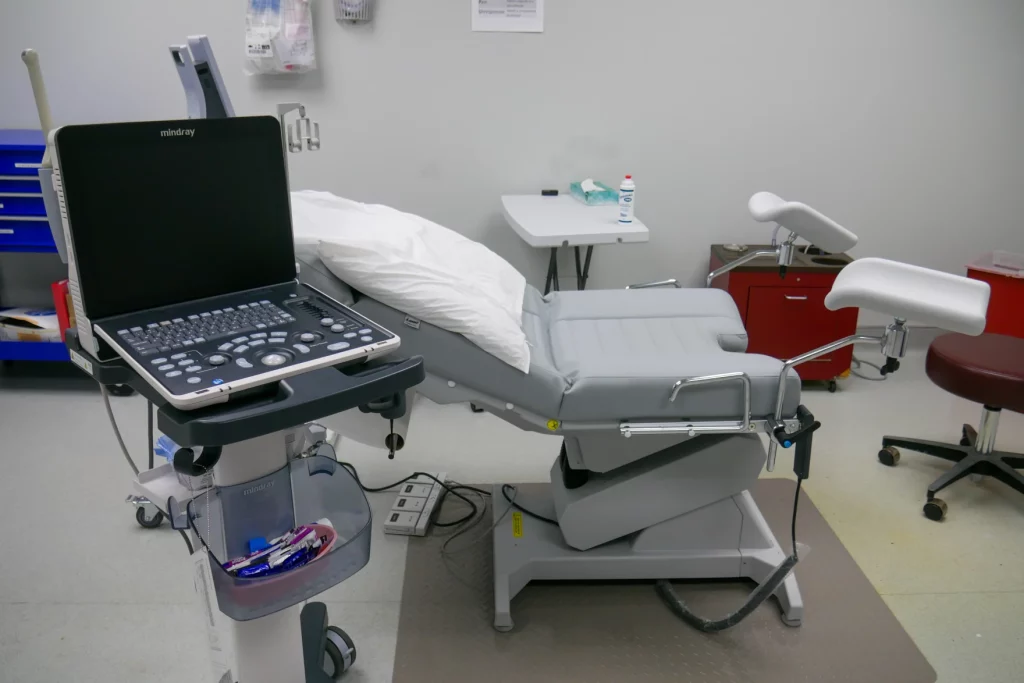Wichita, KS — A resounding statewide vote in Kansas to protect abortion rights last summer won’t stop the Republican-controlled Legislature from attempting to make it harder to get an abortion this year.
Whether anti-abortion lawmakers will be able to enact further restrictions this legislative session — in spite of a 2019 Kansas Supreme Court decision ruling that the state’s constitution protects the right to an abortion — will turn on how aggressively they press the issue and how Kansas courts respond.
As lawmakers returned to the Statehouse, Republican leaders indicated that reducing abortions remained a legislative priority, but stopped short of outlining many specific policies beyond protecting existing abortion restrictions — already some of the most strict in the country short of outright bans.
They also vowed to funnel more money into crisis pregnancy centers, organizations that offer resources for women with unwanted pregnancies but typically discourage them from getting abortions and have been criticized for using misleading tactics.
“There’s a host of things we can do,” Senate President Ty Masterson, an Andover Republican, said at a Tuesday news conference of GOP leaders. “Probably the biggest question to be answered goes to autonomy, and when does the young lady in utero receive her autonomy, and what are the rights of that person, and when does that begin? And I think there are questions to be asked.”
But legal experts said they expect to see bills that go further than that, testing the limits of what other abortion restrictions Kansas courts might permit.
“I suspect that the Legislature would resume what had appeared to be its previous practice of enacting laws that push the boundaries of constitutionally permissible regulation of abortions,” said University of Kansas law professor Richard Levy. “(They’ll want) to find out what those boundaries are and seek to restrict abortions as much as possible in light of those boundaries.”
Abortion rights advocates said they’re gearing up for a fierce fight over the issue in Topeka this year.
“We would hope that legislators listen to what voters had to say with their overwhelming vote on the August ballot initiative,” said Aileen Berquist, policy director at the ACLU of Kansas. “But we’ve heard everything from a 14-week ban” — Kansas bans most abortions after 22 weeks of pregnancy — “to more restrictions on providers to (telemedicine restrictions).”
The ramifications would extend far beyond Kansas. The state remains one of the last in its region to allow abortions in the aftermath of the U.S. Supreme Court overturning Roe v. Wade, and has become an unlikely refuge for a swell of people traveling from out of state seeking abortions.
That’s primarily driven by nearby states like Missouri, Oklahoma and Texas and their near-total abortion bans. Kansas laws remain some of the more restrictive among states that still allow abortion, including parental consent rules for minors and things like ultrasound requirements that effectively force women to visit a clinic in person to obtain abortion pills. That trip might take several hours for those who live in rural Kansas.
Kansans for Life, a prominent anti-abortion lobbying group, has not yet publicly released its legislative agenda for this year. But spokesperson Danielle Underwood said increasing funding for crisis pregnancy centers is a key priority.
“We’re pleased to see Kansas House and Senate Republicans boldly stating they’ll continue to support moms and babies by standing with pregnancy resource centers,” Underwood said in an email.
Jeanne Gawdun, a senior lobbyist with the group, said she’s still talking with lawmakers about what other legislation Kansans for Life might push during the 2023 legislative session.
“We are not going to abandon women and their babies,” she said. “In the past, we’ve supported various things like abortion pill reversal” — referencing a bill that nearly became law in 2019 that would have required providers to tell patients about a controversial and scientifically disputed treatment purported to reverse the effects of abortion pills.
Political analysts said the Republican caucus might be less united around anti-abortion legislation than in the past given voters’ decisive rejection of the anti-abortion constitutional amendment last year.
Neal Allen, a political science professor at Wichita State University, said it’s plausible that Republican leadership would focus less on restricting abortion this year for that reason — but that won’t prevent individual lawmakers from introducing legislation on the issue.
“The Kansas legislature has made restricting abortion and making it harder to access abortion services a priority for the last 20 years,” he said. “I don’t think that’s going to completely change in this next session.”
Abortion pills and telemedicine
In the months since Roe fell, restrictions around abortion pills have emerged as a leading battleground in the fight over abortion access in Kansas and nationally.
Around two-thirds of abortions in Kansas and over half of abortions nationally are done by medication. A two-drug regimen of mifepristone, a tightly controlled drug commonly referred to as the abortion pill, followed by misoprostol is approved by the Food and Drug Administration to end pregnancies of up to 10 weeks.
A bill introduced on the first day of the legislative session by Kansas Senator Mark Steffen, a Hutchinson Republican, would ban providers from prescribing those medications over telemedicine.
That comes less than two months after a Shawnee County judge temporarily blocked an existing ban on telemedicine abortion care, prompting a Wichita Planned Parenthood clinic to begin telehealth conferences with offsite providers in order to increase appointment availability.
Telemedicine access to abortion pills in the traditional sense, where a patient could get a prescription without physically visiting a clinic, is still largely out of reach for Kansans because of a state law requiring women undergo an ultrasound before obtaining an abortion.
Myfanwy Jensen-Fellows, advocacy director for the Wichita clinic Trust Women, said she wasn’t surprised to see the latest telemedicine ban introduced.
“What we’re seeing is a reaction from the state Legislature against the headway that was made through the injunction of the telemedicine ban,” she said.
But if the bill were to become law, it would be unlikely to survive a challenge in court, said Stephen McAllister, a KU law professor and former U.S. attorney for Kansas under President Trump.
“I don’t see, in light of (the recent telemedicine ruling), how it would be able to take effect,” he said.
A 15-week ban; a ‘born-alive’ law
More restrictive anti-abortion legislation is on the table this session, such as a ban after 15 weeks or a “born-alive” bill that echoes legislation passed by the U.S. House this week.
That would require doctors to give medical care to infants born prematurely after an abortion attempt. Critics say such legislation is politically motivated and medically unfounded.
“We don’t encounter situations such as these in abortion clinics,” said Iman Alsaden, chief medical officer of Planned Parenthood Great Plains.
Legal experts said that if similar proposals became law in Kansas, they would be unlikely to survive court challenges.
“It’s not impossible,” Levy said, “but that would seem to me to be a long shot.”
McAllister said they would likely be struck down in court before taking effect.
“Those lawsuits would probably go from a district judge straight to the (Kansas) Supreme Court,” he said. “I think there’d be a pretty rapid determination made.”
Overriding the governor
Any anti-abortion legislation to come out of the Statehouse would likely be vetoed by Democratic Gov. Laura Kelly. That would require a two-thirds majority vote in both the House and Senate to override.
Republicans maintained a veto-proof supermajority in both chambers, but that doesn’t mean that the caucus would be united on a potential bill — particularly so soon after voters so overwhelmingly chose to protect abortion rights.
Allen, the political science professor, said Republicans from politically moderate districts might be more cautious to support more abortion restrictions this year.
“Their incentives are different,” he said. “Those folks are going to have to think really hard about whether they want to continue supporting abortion restrictions.”
And where Republicans may have been able to persuade a few Democrats to vote for abortion restrictions in the past, that may be less likely in light of last year’s referendum.
“There are certainly Democratic members of the Kansas Legislature who are personally opposed to abortion, but I don’t know of any of them who are opposed to a woman’s right to make her own decisions concerning reproductive health,” said Rep. John Carmichael, a Wichita Democrat. “What that means is you will see no support from Democratic legislators in either house for further restrictions on abortion services.”
The courts
Abortion opponents could make headway this year in changing the judiciary, which has emerged as perhaps the leading impediment to enacting stiffer abortion restrictions in Kansas.
All seven Kansas Supreme Court justices survived retention votes in November, despite opposition by Kansans for Life to all but one.
But lawmakers are set to consider legislation that would give the governor more power over selecting Supreme Court justices — something that could help abortion opponents after Kelly leaves office.
Attorney General Kris Kobach, a staunch abortion opponent who ran on a promise to make Kansas “the most pro-life state in America,” has proposed changes to the judicial selection process like direct election and Senate confirmation that would make it easier to place anti-abortion judges on the state’s highest court.
“The goal is to get off the bench those folks who would vote to continue to uphold abortion rights,” McAllister said.
Targeting the judiciary could allow lawmakers to steer the conversation away from explicit discussions of abortion rights and into territory they might consider more politically advantageous, like education or criminal justice — while still influencing abortion policy.
“Leadership in the House and Senate would likely be happy if, instead of talking about the specifics of abortion restriction,” Allen said, “we’re talking about restricting the power of judges.”
Mary Ziegler, a University of California-Davis law professor and historian of the anti-abortion movement, said the efforts in Kansas reflect sparring taking place across the country around the power and makeup of judiciaries.
“The more that state supreme courts are the places we go to hash out constitutional disagreements about abortion,” she said, “the more we’re going to see a supercharging of debates around state supreme courts.”
Rose Conlon reports on health for KMUW and the Kansas News Service. You can follow her on Twitter at @rosebconlon or email her at conlon@kmuw.org.
The Kansas News Service is a collaboration of KCUR, Kansas Public Radio, KMUW and High Plains Public Radio focused on health, the social determinants of health and their connection to public policy.
Kansas News Service stories and photos may be republished by news media at no cost with proper attribution and a link to ksnewsservice.org.













